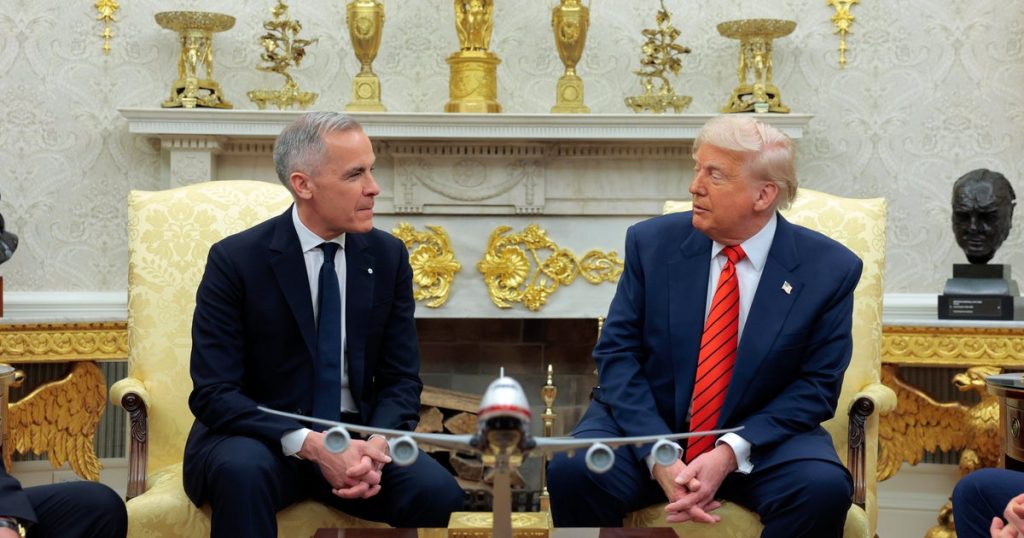In a significant meeting in the Oval Office, President Trump and Canadian Prime Minister Mark Carney discussed pivotal issues between the two nations. Their conversation touched on topics including the controversial suggestion of annexing Canada and ongoing trade tensions marked by tariffs on Canadian goods. Carney firmly reiterated that Canada is not for sale, emphasizing the importance of sovereignty for his nation amidst humorous remarks from Trump about real estate.
| Article Subheadings |
|---|
| 1) A Meeting of Minds |
| 2) The Territorial Proposition |
| 3) Not for Sale |
| 4) Trade Tensions Remain High |
| 5) Future Implications |
A Meeting of Minds
On Tuesday, President Trump held a significant meeting with Prime Minister Mark Carney of Canada inside the Oval Office. This meeting marked their first direct dialogue since Carney’s Liberal Party secured victory in the recent Canadian elections. Both leaders approached the meeting with notable intent, focusing on matters of national interest and bilateral relations. Trump’s reputation as a real estate mogul was evident during the conversation, as he likened discussions about Canada to those involving high-stakes property deals.
The Territorial Proposition
During their discussion, Trump humorously reiterated a previous notion that Canada could be annexed as the United States’ 51st state. Elaborating on this bizarre proposition, he mentioned, “When you get rid of that artificially drawn line … I said, ‘That’s the way it was meant to be.'” Although framed in jest, the suggestion brings to light deeper historical and cultural interconnections between the two nations.
Not for Sale
In response to Trump’s remarks regarding potential changes in Canadian sovereignty, Carney firmly stated that “Canada is not for sale, and it won’t be for sale, ever.” This declaration highlights Canada’s steadfast commitment to maintaining its national identity and independence. Carney further referenced the enduring significance of national boundaries, expanding on his statement with analogies to other notable landmarks like Buckingham Palace, asserting that some places possess intrinsic worth that transcends commercial value.
Trade Tensions Remain High
Aside from territorial discussions, trade emerged as a crucial topic. Trump made it clear that the current tariffs imposed on Canadian goods are non-negotiable and will remain in place, further straining U.S.-Canada relations. The Prime Minister expressed his concerns about these tariffs, outlining their detrimental effects on Canadian businesses. The discussion underscored the ongoing struggles surrounding trade agreements and economic collaboration between the two nations.
Future Implications
The implications of this meeting could reverberate widely, impacting a range of diplomatic and economic avenues. While Trump reignited the discussion about Canada’s status, he dialed down expectations regarding military actions or aggressive approaches, stating he “just doesn’t see it.” This comment reflects a nuanced framework within which the two countries might navigate challenges going forward.
| No. | Key Points |
|---|---|
| 1 | Trump and Carney discussed territorial integrity, underlining Canada’s non-negotiable status as an independent nation. |
| 2 | The meeting emphasized high trade tensions, particularly regarding existing tariffs affecting Canadian goods. |
| 3 | Carney’s assertion that “Canada is not for sale” reaffirms Canadian sovereignty. |
| 4 | Trump’s comments reflect a broader historical and cultural context between the U.S. and Canada. |
| 5 | The implications of the meeting could affect future diplomatic relations and economic negotiations. |
Summary
The meeting between President Trump and Prime Minister Carney signals both leaders’ awareness of the multifaceted nature of U.S.-Canada relations. While certain humorous remarks brought levity to serious discussions, the reaffirmation of Canada’s sovereignty juxtaposed with ongoing trade issues paves the way for a complex but necessary dialogue. As both nations navigate their intertwined futures, the outcomes of such meetings hold significant weight for international economics and national policies.
Frequently Asked Questions
Question: What were the primary topics discussed in the meeting between Trump and Carney?
The primary topics included Canadian sovereignty, the concept of annexation, and ongoing trade tensions characterized by tariffs on Canadian goods.
Question: How did Prime Minister Carney respond to Trump’s suggestion of annexation?
Carney firmly stated that “Canada is not for sale” and highlighted the importance of maintaining Canada’s sovereignty.
Question: What is the significance of the tariffs discussed?
The tariffs have created strains on U.S.-Canada relations, affecting trade dynamics and economic interactions between the two countries.


